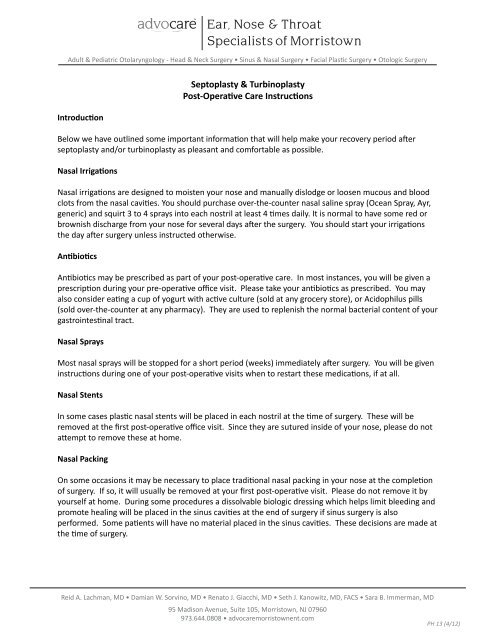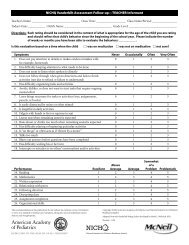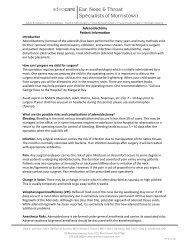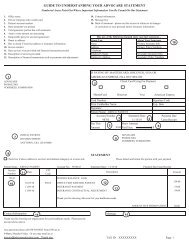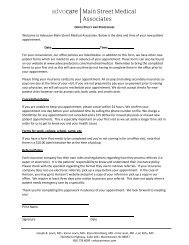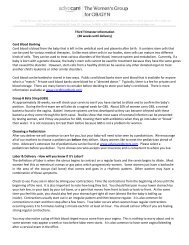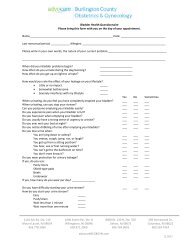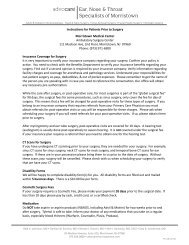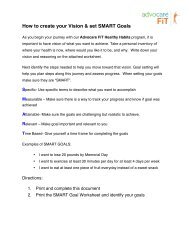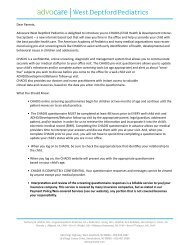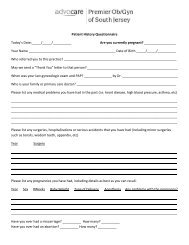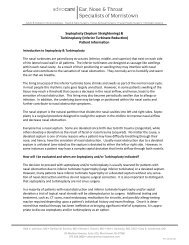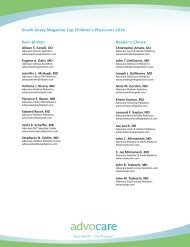Septoplasty & Turbinoplasty Post-Operative Instructions - Advocare
Septoplasty & Turbinoplasty Post-Operative Instructions - Advocare
Septoplasty & Turbinoplasty Post-Operative Instructions - Advocare
- No tags were found...
Create successful ePaper yourself
Turn your PDF publications into a flip-book with our unique Google optimized e-Paper software.
Adult & Pediatric Otolaryngology - Head & Neck Surgery • Sinus & Nasal Surgery • Facial Plastic Surgery • Otologic SurgeryIntroduction<strong>Septoplasty</strong> & <strong>Turbinoplasty</strong><strong>Post</strong>-<strong>Operative</strong> Care <strong>Instructions</strong>Below we have outlined some important information that will help make your recovery period afterseptoplasty and/or turbinoplasty as pleasant and comfortable as possible.Nasal IrrigationsNasal irrigations are designed to moisten your nose and manually dislodge or loosen mucous and bloodclots from the nasal cavities. You should purchase over-the-counter nasal saline spray (Ocean Spray, Ayr,generic) and squirt 3 to 4 sprays into each nostril at least 4 times daily. It is normal to have some red orbrownish discharge from your nose for several days after the surgery. You should start your irrigationsthe day after surgery unless instructed otherwise.AntibioticsAntibiotics may be prescribed as part of your post-operative care. In most instances, you will be given aprescription during your pre-operative office visit. Please take your antibiotics as prescribed. You mayalso consider eating a cup of yogurt with active culture (sold at any grocery store), or Acidophilus pills(sold over-the-counter at any pharmacy). They are used to replenish the normal bacterial content of yourgastrointestinal tract.Nasal SpraysMost nasal sprays will be stopped for a short period (weeks) immediately after surgery. You will be giveninstructions during one of your post-operative visits when to restart these medications, if at all.Nasal StentsIn some cases plastic nasal stents will be placed in each nostril at the time of surgery. These will beremoved at the first post-operative office visit. Since they are sutured inside of your nose, please do notattempt to remove these at home.Nasal PackingOn some occasions it may be necessary to place traditional nasal packing in your nose at the completionof surgery. If so, it will usually be removed at your first post-operative visit. Please do not remove it byyourself at home. During some procedures a dissolvable biologic dressing which helps limit bleeding andpromote healing will be placed in the sinus cavities at the end of surgery if sinus surgery is alsoperformed. Some patients will have no material placed in the sinus cavities. These decisions are made atthe time of surgery.Reid A. Lachman, MD • Damian W. Sorvino, MD • Renato J. Giacchi, MD • Seth J. Kanowitz, MD, FACS • Sara B. Immerman, MD95 Madison Avenue, Suite 105, Morristown, NJ 07960973.644.0808 • advocaremorristownent.comPH 13 (4/12)
CALL THE OFFICE (973-644-0808) IF YOU EXPERIENCE ANY OF THE FOLLOWING SYMPTOMS• Excessive bleeding (bright red blood) that cannot be controlled by squeezing the nostrils together for10 to 15 minutes. It is normal to experience some bleeding out of the nose or down the throat formany days after sinus surgery. You may also have some normal blood-streaking in your mucus.• Eye swelling or changes in your vision including blurry, double, or decreased vision.o• Fever/temperature > 100.8 F.• Persistent clear watery drainage from your nose.• Worsening headaches and/or neck stiffness.• Pain uncontrolled by your prescribed pain medication.• Persistent nausea or vomiting.**In the event that you experience a medical emergency or are unable to contact the office, please go tothe nearest Emergency Room.<strong>Post</strong>-<strong>Operative</strong> Visit Checklist□ You may need someone to drive you to and from the office. Please plan accordingly.□ If you are still having pain, take your prescribed pain medication or Extra Strength Tylenol(acetaminophen) 1 hour prior to your scheduled visit. The nose is most sensitive during theimmediate days after surgery.□ Eat and drink prior to your visit.□ Bring a list of your medications and any questions with you.


